Who's paying the president now
Government contractors, police, local GOP groups, evangelicals continue to pay Trump
Here’s a rundown of notable recent and upcoming events at Trump properties.
These companies—including government contractors Dell EMC, Carahsoft, and FedData—sponsored a fundraiser for veterans charity the Johnny Mac Fund at the U.S. president’s Sterling, Virginia golf course in June.

The Monmouth County Republican Committee’s annual victory gala was at the Colts Neck, N.J. golf course the head of its party owns.
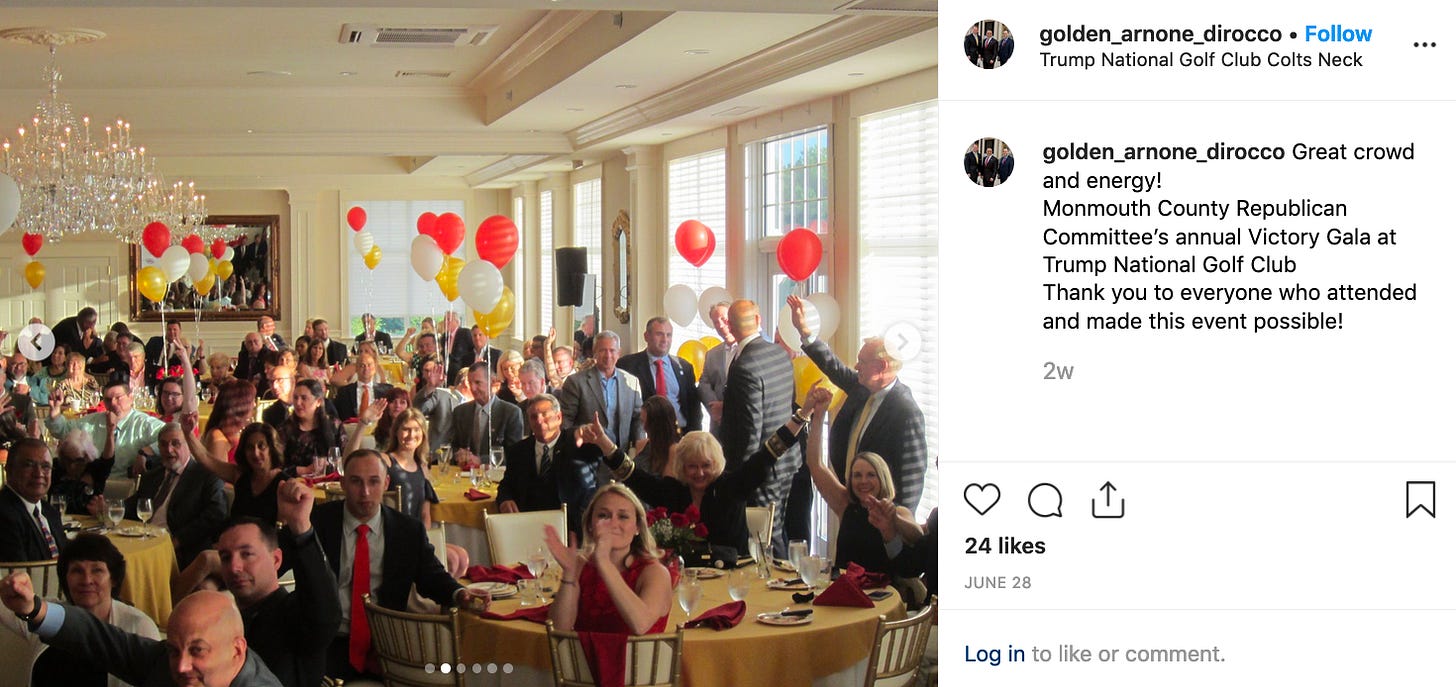
The New Jersey State Troopers Non Commissioned Officers Association Foundation held its annual golf outing at Trump Bedminster—$500 entry fee—on June 17. Sorry, “no cargo shorts.”

“Last month…a couple of dozen oil and gas executives with the Domestic Energy Producers Alliance were checking into the president’s hotel before a day of schmoozing with Republican House leaders and cabinet officials” reported Peter Stone for The Guardian. It was a return visit for that group.
Former Trump Hotels Collection vice president Laurie Luongo signed her book at the Trump Hotel D.C. this morning with former Trump Organization executive vice president and chief compliance counsel, George Sorial.

Evangelical minister Lance Wallnau, who described Pentecostals as “the access to presidents of the voice of god” and broadcast live from the Trump Hotel D.C. before the state of the union address, is hosting another dream trip at the president’s D.C. hotel this year. From the event’s website:
To “Make America Great Again,” it will require something more than a President can do. His battle is in the natural, but the remnant God is raising up has spiritual authority in every sphere of our assignment. Your Destiny Blueprint will unfold during this battle; You need to understand your call, and the call to your Nation in the next two years, six years, and until the end of this decade.
That is why we felt led to do this event at the majestic Trump Hotel in Washington, D.C. The perfect place for this spiritual transaction and impartation.
The Lord told me that this is where many of you are going to get aligned with the office and assignment He has called you to in the nations.

Three days until a paid subscription is required to receive all new 1100 Pennsylvania issues
Starting Monday most new issues of 1100 Pennsylvania will be available only to paid subscribers. If you did not pay for a membership when you signed up, you received a separate email with information about subscribing earlier today. If you did pay for a membership, nothing changes and you’ll continue to receive every issue of 1100 Pennsylvania and have full access to the online archives.
Support ad-free, in-depth independent reporting on the conflicts at the Trump Hotel D.C. and the president’s other businesses: select the red button that says “Subscribe now” and choose the $5/month or $50/year option. Thanks!
Unpaid subscribers will continue to receive about one free issue a week.
Liquor-license hearings to be scheduled in the next two weeks
The D.C. Alcoholic Beverage Regulation Administration will schedule additional hearings in the next two weeks on an objection to the Trump Hotel D.C.’s liquor-license renewal, according to an ABRA spokesperson.
Last month, ABRA rejected the hotel’s motion to dismiss a protest of its liquor license renewal. The complaint had been filed by a group of clergy and judges. D.C. law requires liquor-license holders be “of good character”—a criterion this group claims the U.S. president does not meet, according to a letter from the group’s attorney to the D.C. control board.
Campaign expenditures
Rely on Your Beliefs Fund, associated with Sen. Roy Blunt (R–MO), spent $3,540.28 on event catering at the D.C. hotel owned by the head of the executive branch and Blunt’s party. It marked the first time Blunt’s PAC or campaign has reported spending money at the Trump Hotel D.C.
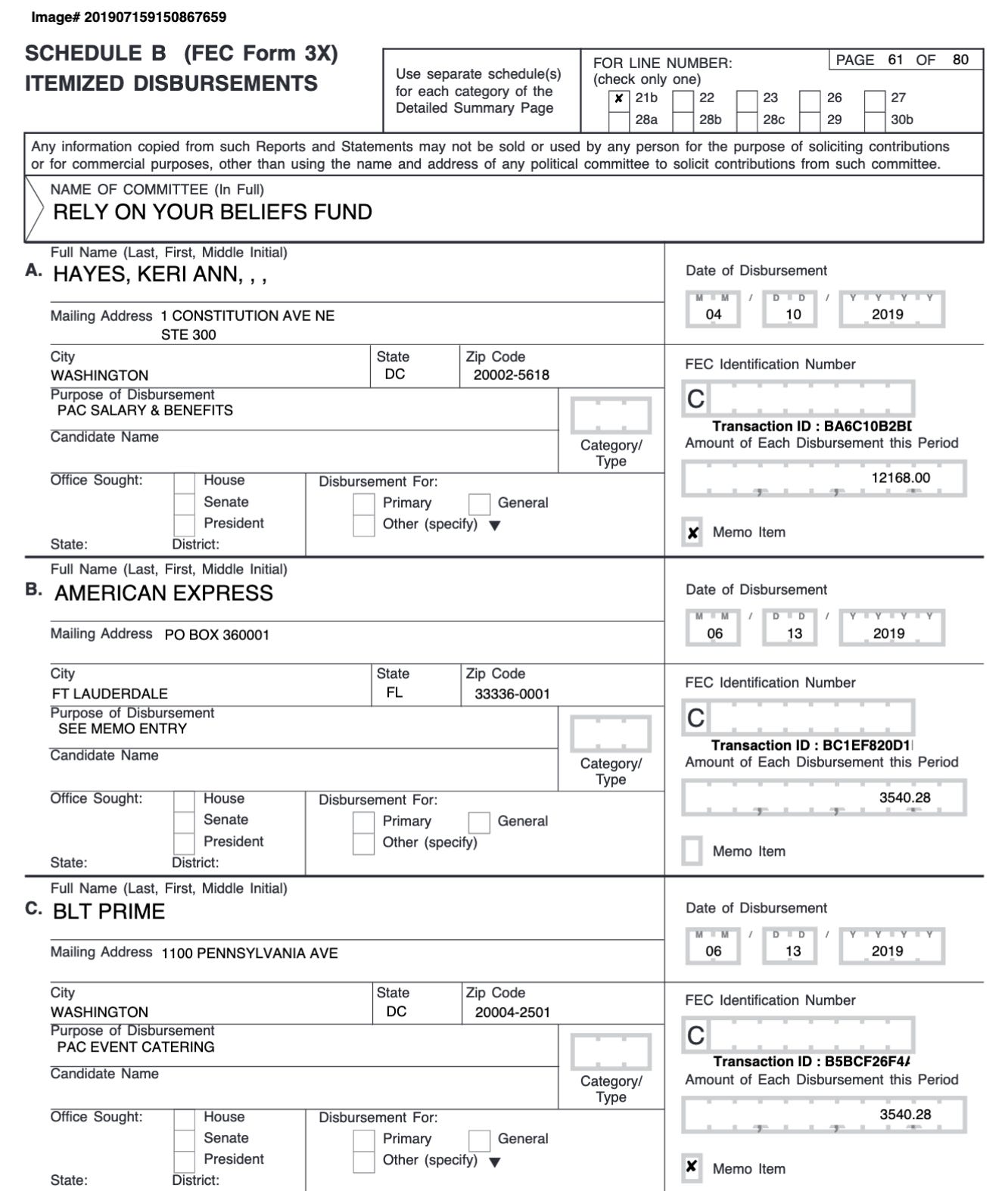
The conservative Family-PAC Federal spent $4,306.89 at the Republican president’s Chicago hotel in April. Most of that amount went to pay for a fundraising luncheon featuring Rep. Jim Jordan (R–OH), the ranking member of the House Oversight committee and one of the Trump Org’s biggest champions in Congress. Family–PAC Federal has reported spending a total of $11,331.31 at the Trump Hotel Chicago.
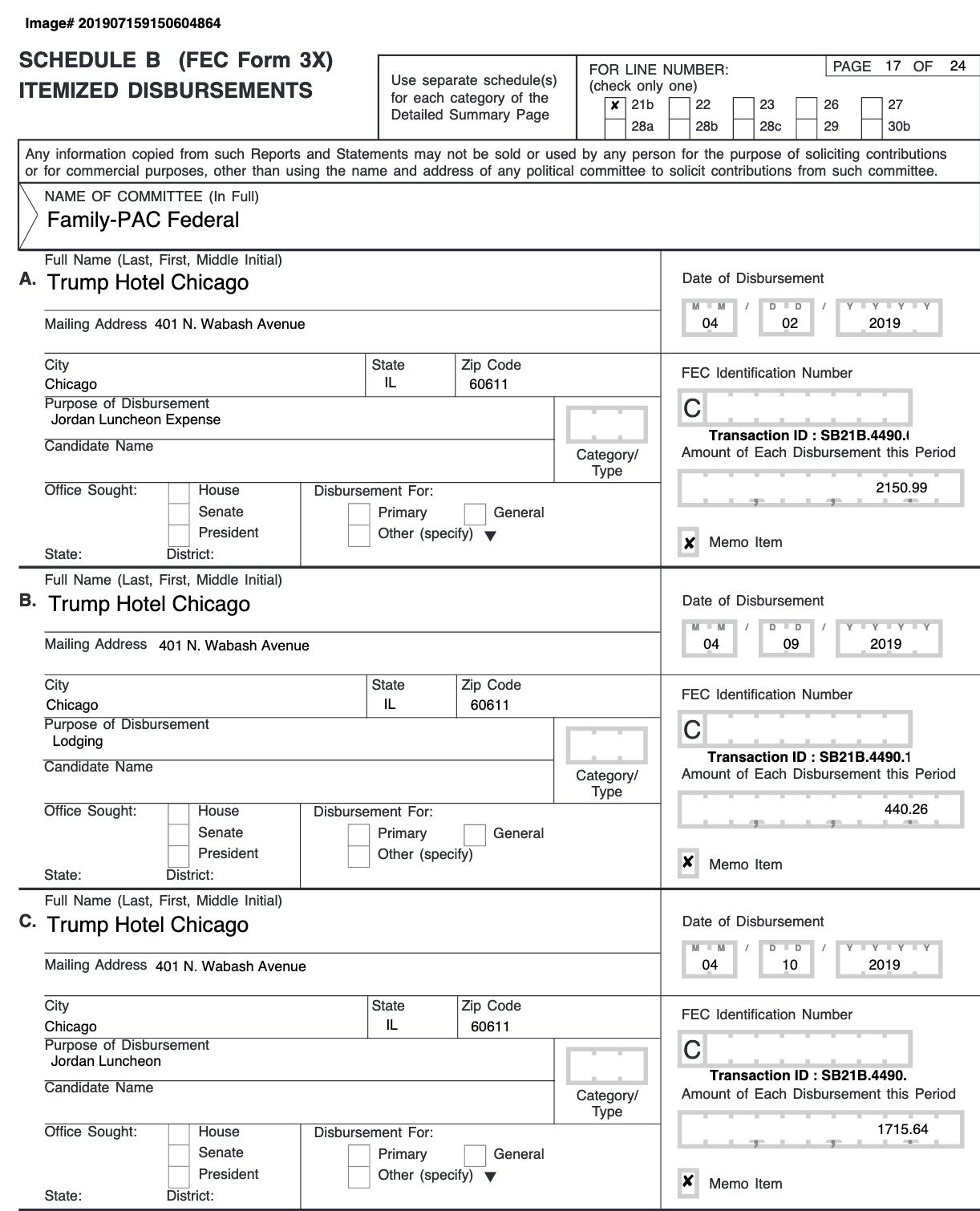
Notable sightings
A glimpse of the foreign officials, government employees, politicians, lobbyists, and the like who patronize or appear at Trump businesses. Most people shown here have reasons to want to influence the Trump administration, rely on its good graces for their livelihoods, or should be providing oversight. Additionally, high-profile guests serve as draws for paying customers.
A freshly gagged Roger Stone posed with a former government relations liaison at Texas’s General Land Office, Sam Polser.
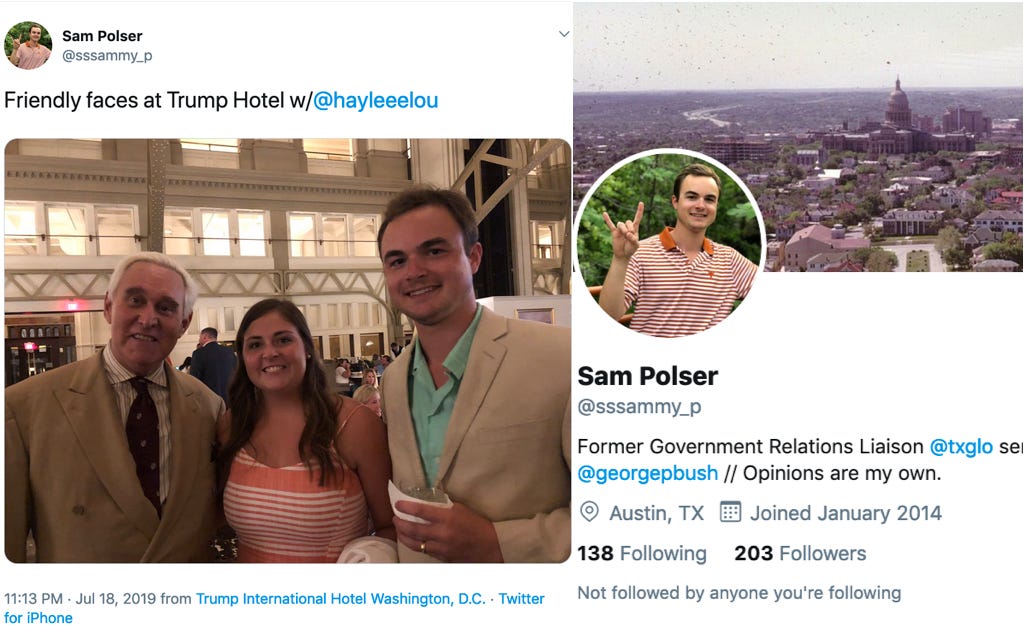
Turkish designer and political activist Barbaros Şansal, who Selin Girit of the BBC described as “an outspoken critic of Turkey’s ruling Justice and Development Party,” posed in the U.S. president’s hotel. The photo was posted just days after Trump announced the U.S. will cancel Turkey’s order of F-35s.
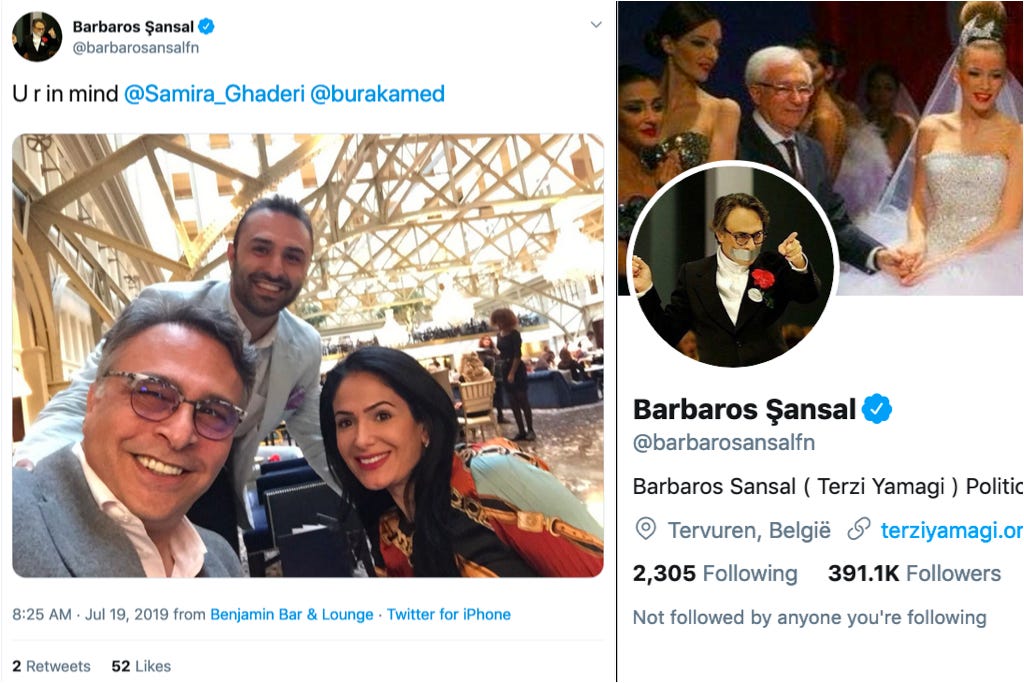
Other Trump Organization news
“Mnuchin appears to be first treasury secretary to intervene in Congress’s request for private tax returns, memo says” by Jeff Stein for The Washington Post
Trump’s attorneys filed a motion to narrow the scope of subpoenas the House Financial Services and Intelligence committees served Deutsche Bank in search of documents regarding Trump’s business reported David Enrich of The New York Times. The process also would delay Deutsche Bank’s compliance.
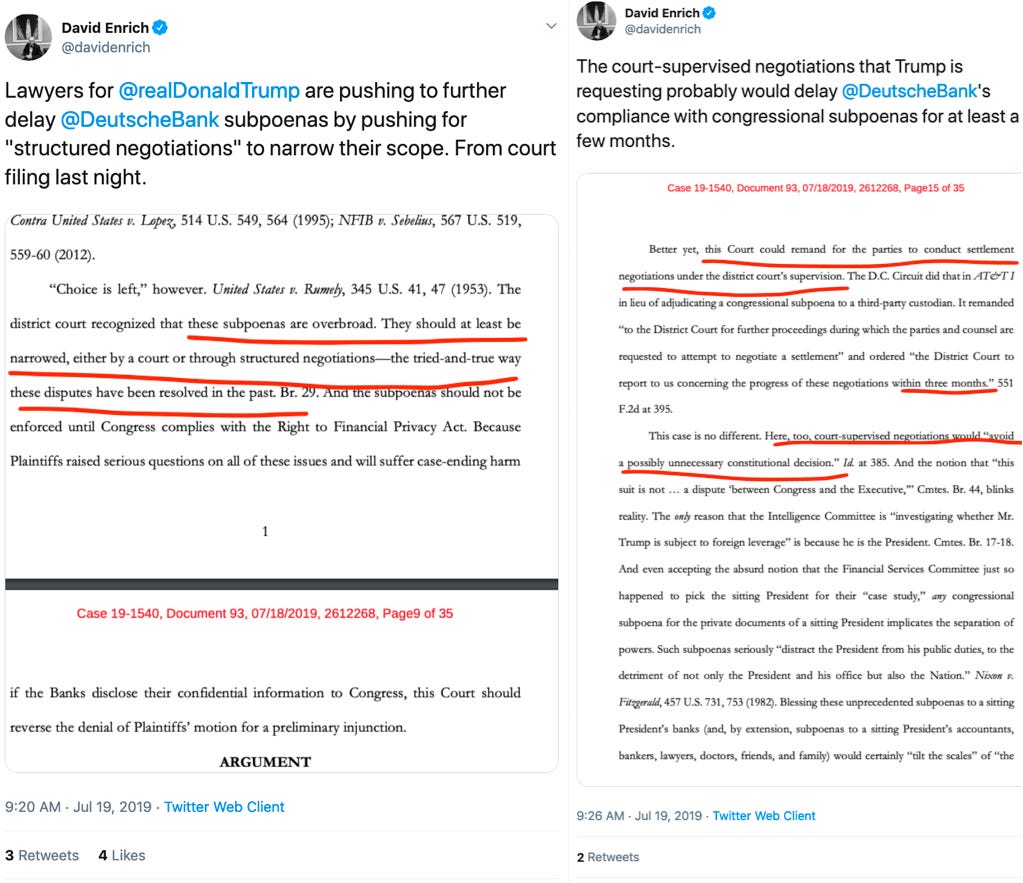
A month after President Trump announced plans to redesign Air Force One, making it look like his personal jet, the Trump Store announced a new collection of merchandise inspired by Trump’s personal jet.
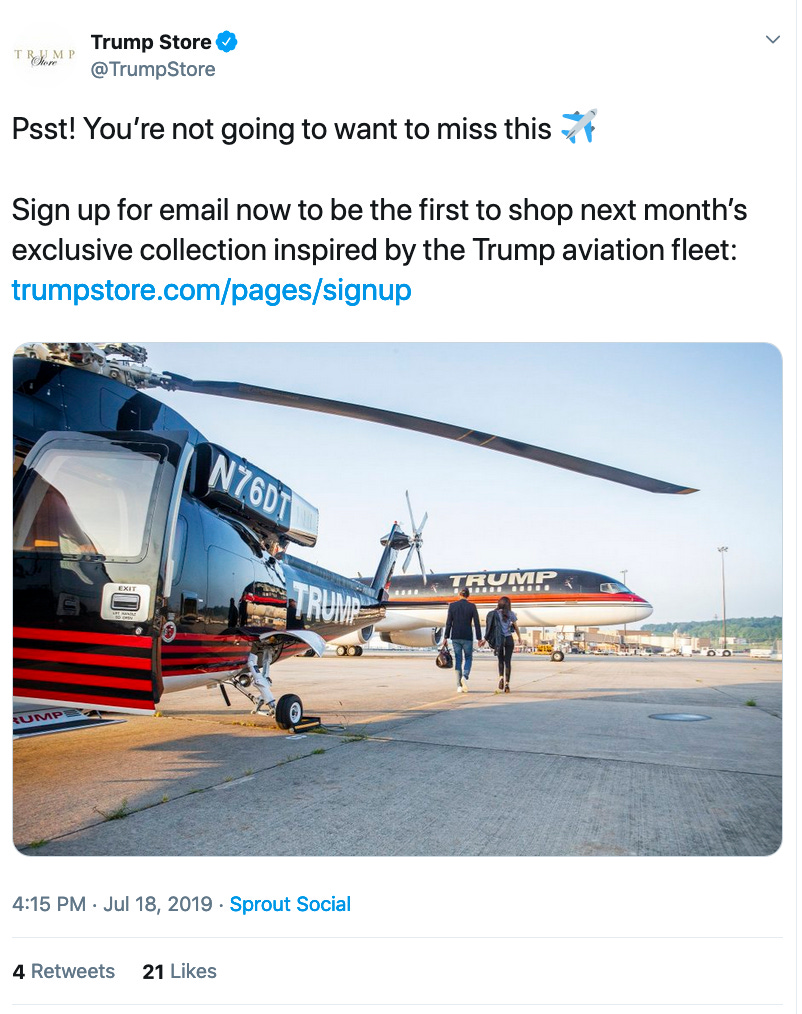
House investigations (latest change July 19, 2019)
UPDATE Financial Services
The committee sent a inquiry to Deutsche Bank AG on its ties to Trump, according to the bank on Jan. 24. On March 1, Chair Rep. Maxine Waters (D–CA) said the bank is cooperating with her committee and that her staffers met with bank employees. On March 11, the committee requested documents on Trump’s businesses from Capital One; the bank said it was preserving documents but needed a subpoena to comply per Politico. On April 15, that subpoena was issued. The committee reportedly has subpoenaed nine banks for information about the president’s finances. President Trump, Don Jr., Eric, Ivanka, and their businesses sued Deutsche Bank and Capital One on April 30 to prevent them from sharing records with Congress. Deutsche Bank reportedly has been willing to cooperate with lawmakers. On May 3, the Trumps filed for a preliminary injunction to block the subpoenas. But U.S. District Court Judge Edgardo Ramos (an Obama appointee) declined to issue that injunction on May 22, saying that the financial institutions can comply with the lawmakers’ request. The Trumps’ appealed that ruling on May 24. The lawmakers and Trumps agreed to refrain from enforcing the subpoenas until after the appellate court rules. The court announced it will expedite the briefing process, to end on July 18. Oral arguments are scheduled for Aug. 23. On July 18, Trump’s attorneys filed a motion to narrow the scope of the subpoenas. The process they proposed also would delay Deutsche Bank’s compliance, according to David Enrich of The New York Times.
Foreign Affairs
Chair Elliot Engel (D–NY) “plans to investigate whether President Donald Trump’s businesses are driving foreign policy decisions, including whether Trump violated the emoluments clause of the Constitution in the process” per CNN on Jan. 23.
UPDATE Judiciary
On March 4, the committee “served document requests to 81 agencies, entities, and individuals believed to have information relevant to the investigation. Among the individuals the committee requested documents from are Donald Trump Jr. and Eric Trump, Trump Org EVP and COO Michael Calamari, CFO Alan Weisselberg, EVP and chief legal officer Alan Garten, Trump tax attorney Sherri Dillon, longtime Trump executive assistant Rhona Graff, former Trump advisor Felix Sater (whom it interviewed on March 21), former Trump attorney Michael Cohen, and Trump associate and inaugural chair Tom Barrack. The committee received “tens of thousands” of documents by its March 18 deadline, according to its chair, Jerry Nadler (D–NY). Among the respondents: Barrack, Steve Bannon, and the National Rifle Association. But more than half of the targets still had not replied by April 3. On that day, the committee authorized subpoenas for former White House aides Bannon, Ann Donaldson, Hope Hicks, Donald McGahn, and Reince Priebus, per Politico. And on May 21, the committee did in fact subpoena Hicks and Donaldson. Attorneys for the Trump Organization, Don Jr., and Eric did not respond to Politico’s inquires if their clients planned to reply. The committee is considering making additional document requests, including to Trump’s personal attorney Rudy Giuliani. On July 18, citing inconsistencies with new evidence, the committee asked Hicks to clarify her testimony.
UPDATE Intelligence
On Feb. 6, Chair Adam Schiff (D–CA) said his committee would investigate links or coordination between the Russian government/foreign actors and individuals associated with Trump’s businesses, as well as if foreign actors sought to compromise or hold leverage over Trump’s businesses. Schiff hired a prosecutor experienced in combating Russian organized crime to lead the investigation.
On Feb. 10, Schiff said the committee would investigate Trump’s relationship with Deutsche Bank, a major lender to the Trump Organization. On Jan. 24, the committee sent an inquiry to Deutsche Bank AG on its ties to Trump. On Feb. 28, an aide said the panel expects to interview Trump Org. CFO Allen Weisselberg.
During testimony on March 6, Michael Cohen turned over documents that allegedly show how Trump’s then-personal lawyer, Jay Sekulow, edited Cohen’s statement regarding Trump Tower Moscow. Cohen later read this revised statement before the House and Senate Intelligence Committees. In closed-door testimony in March, Cohen claimed the president submitted a false insurance claim regarding a fresco in Trump Tower. On July 9, Felix Sater testified but “refus[ed] to address whether he knew that the president’s former lawyer, Michael Cohen, planned to lie under oath about a failed Trump Tower project in Moscow,” The Washington Post reported. Georgian-American businessman Giorgi Rtskhiladze also discussed his Trump Tower Moscow proposal with the committee on June 26.
The committee seeks to interview inauguration organizer Stephanie Winston Wolkoff.
On March 11, the committee requested documents on Trump’s businesses from Capital One; the bank “said it was already preserving documents but needs a subpoena in order to comply” per Politico. On April 15, that subpoena was issued. All told, the committee reportedly has subpoenaed nine banks for information about President Trump’s finances. President Trump, Don. Jr., Eric, Ivanka, and their businesses sued Deutsche Bank and Capital One on April 30, however, to prevent them from sharing financial records with Congress. Schiff said Deutsche Bank has been willing to cooperate with lawmakers. On May 3, the Trumps filed for a preliminary injunction to block the subpoenas. But U.S. District Court Judge Edgardo Ramos (an Obama appointee) declined to issue that injunction on May 22, saying that the financial institutions can comply with the lawmakers’ request. The Trumps’ appealed that ruling on May 24. The lawmakers and Trumps agreed to refrain from enforcing the subpoenas until after the appellate court rules. The court announced it will expedite the briefing process to end on July 18. Oral arguments are scheduled for Aug. 23. On July 18, Trump’s attorneys filed a motion to narrow the scope of the subpoenas. The process they proposed also would delay Deutsche Bank’s compliance, according to David Enrich of The New York Times.
Oversight and Reform
Chair Elijah Cummings’s (D–MD) staff “sent out 51 letters to government officials, the White House, and the Trump Organization asking for documents related to investigations that the committee may launch,” on Jan. 13. In a Feb. 15 letter to White House Counsel Pat Cipollone, Cummings said the committee received documents showing White House attorney Stefan Passantino and long-time Trump personal attorney Sheri Dillon provided “false information” to the Office of Government Ethics regarding Michael Cohen’s “hush-money payments.” As a result, Cummings wants to depose Passantino and Dillon; the White House, however, rejected Cummings’ request to interview Passantino. And on Feb. 27, Cohen testified to the committee about those payments and other Trump Organization business practices, which could lead to allegations of possible insurance fraud. The next day, House Democrats signaled they would seek testimony from Trump Organization officials whom Cohen alleged were implicated, including Donald Trump Jr., Ivanka Trump, and CFO Allen Weisselberg.
On March 6, Cummings requested information from GSA about its reversal of a decision to relocate FBI headquarters, which is across the street from the Trump Hotel D.C. On April 12 Cummings wrote to the GSA again, this time requesting all monthly reports from the hotel, information about liens on the hotel, correspondence between the Trump Org and GSA, and legal opinions regarding the Trump Org’s compliance with the lease. Cummings gave an April 26 deadline; GSA failed to meet it, citing confidentiality concerns. Cummings threatened to issue a subpoena.
The committee also has requested 10 years of Trump’s financial records. On March 11, the committee requested documents on Trump’s businesses from Capital One; the bank “said it was already preserving documents but needs a subpoena in order to comply” per Politico. On April 12, Cummings notified committee members that he plans to subpoena Mazars USA, Trump’s accounting firm, for his financial statements. President Trump, the Trump Organization, and the Trump Hotel D.C. sued Cummings and Mazars USA on April 22 in an attempt to prevent the release of the records. Cummings postponed the subpoenas’ deadline while the courts addresses the president’s suit. On May 20, U.S. District Judge Amit P. Mehta (an Obama appointee) denied the president’s motion. Trump appealed the next day and two days after that, the D.C. Circuit Court of Appeals’ judges fast tracked the case, with oral arguments he;d on July 12. After the hearing. Politico’s Josh Gerstein predicted the judges would vote 2-1 against Trump—David Tatel (a Clinton appointee) and Patricia Millett (an Obama appointee) seemed to side with the lawmakers, while Neomi Rao (a Trump appointee) seemed partial to Trump. In a filing on June 10, Trump’s attorneys argued that the committee’s subpoena was invalid because “it is an effort to investigate alleged legal violations—power that is vested in the executive, not Congress.”
Transportation and Infrastructure subcommittee on Economic Development, Public Buildings, and Emergency Management
Transportation committee Chair Peter DeFazio (D–OR) and subcommittee Chair Dina Titus (D–NV) sent a letter to GSA administrator Emily Murphy on Jan. 22 asking for all communication between the GSA and members of the Trump family dating back to 2015, an explanation of how the D.C. hotel calculates its profits, profit statements since the hotel opened, any guidance from the White House regarding the lease, and whether or not Ivanka Trump and Jared Kushner are recused from participating in decisions regarding the property. GSA has “sent a partial response and the subcommittee is reviewing it,” according to a senior House staffer familiar with the situation. When hearings begin, it is likely that Murphy will be the first person called to testify, according to a person familiar with the subcommittee’s plans. Titus is hiring additional staffers to handle the investigation.
On March 6, Titus requested information from GSA about its reversal of a decision to relocate FBI headquarters, which is across the street from the Trump Hotel D.C. NPR reported “Democrats on the committee want to know, among other things, whether there was any political pressure exerted on the GSA by the Trump White House, presidential campaign or transition team. They also want to know how the Trump Hotel calculates its profits, segregates incoming money from foreign governments, and what the Trump Organization owes the GSA on a monthly or annual basis.’”
Ways and Means
On April 3, Chair Richard Neal (D–MA) requested six years of Trump’s personal tax returns and the returns for eight of his businesses (including that of the trust that holds the president’s stake in the D.C. hotel). After the IRS missed Neal’s deadline and then an extension, Treasury Sec. Steve Mnuchin said he’d make a decision whether or not to release the returns by May 6. He declined to do so. On May 10, the committee subpoenaed Mnuchin and IRS commissioner Charles Rettig, giving them a May 17 deadline to turn over Trump’s tax returns. Mnuchin again declined to comply. Neal suspected he’d know his next move by May 24, but earlier he had indicated he’ll take the issue to the federal courts. On July 3, the committee sued the IRS for the returns.
The Oversight subcommittee held a hearing on “legislative proposals and tax law related to presidential and vice-presidential tax returns” on Feb. 7. “We will ask the question: Does the public have a need to know that a person seeking the highest office in our country obeys tax law?” said Chair John Lewis (D–GA). Tax law experts testified.
Lawsuits (latest change July 16, 2019)
D.C. and MD attorneys general’s emoluments lawsuit
District court docket, appellate court docket
Official capacity—On Dec. 20, 2018, the 4th U.S. Circuit Court of Appeals ruled it would hear the president’s appeal of U.S. District Court Judge Peter Messitte’s (a Clinton appointee) rulings that allowed the case to proceed to discovery. The appellate court halted discovery in the case. Discovery had started Dec. 3 and was scheduled to run through Aug. 2, 2019, with Maryland AG Brian Frosh (D) and D.C. AG Karl Racine (D) having subpoenaed the Trump Organization, including its Scottish golf courses; the U.S. Departments of Agriculture, Commerce, Defense, and Treasury and the GSA; and the state of Maine. On July 10 the three appellate judges—Paul Niemeyer (a George H.W. Bush appointee), Dennis Shedd (a George W. Bush appointee), and A. Marvin Quattlebaum (a Trump appointee)—ruled unanimously in President Trump’s favor and dismissed the suit, finding that the AGs did not have standing. Frosh and Racine said they would continue to pursue their options.
Individual capacity—On Dec. 14, Trump’s personal attorneys appealed the denial of their motion to dismiss the case to the 4th U.S. Circuit Court of Appeals. On Dec. 19, the AGs replied to Trump’s motion for a stay pending that appeal by dismissing the claims against him in his “individual capacity to allow the claims against President Trump in his official capacity to move forward expeditiously.” (The AGs brought suit against Trump in his individual capacity after Messite suggested they do so.) Trump’s attorneys, on Dec. 21, opposed the motion to dismiss at the district level, saying the appeals court now has jurisdiction and accused the AGs of “gamesmanship.” On July 10, the appeals court dismissed this case, ruling the AGs did not have standing to bring the suit. Frosh and Racine said they would continue to pursue their options.
Democratic senators, representatives’ emoluments lawsuit
On Sept. 28, U.S. District Court Judge Emmet G. Sullivan (a Clinton appointee) ruled that the legislators have standing to sue. Trump’s Justice Department attorneys filed an interlocutory appeal on Oct. 22. On Jan. 30, 2019, the plaintiffs’ filed a notice of supplemental authority, notifying the court of the GSA inspector general’s report that criticized GSA for failing to consider if the Trump Hotel D.C.’s lease was in compliance with the Constitution after Trump became president. Two days later, the president’s attorneys argued that the IG’s conclusion was not inconsistent with Trump’s argument, but that the judge should ignore that report anyway because the IG has no expertise in interpreting or applying the foreign emoluments clause. On April 30, Sullivan denied Trump’s motion to dismiss the suit. While the president’s attorneys have a supplemental brief due on May 28, on May 14 they filed a motion to stay the proceedings while they appeal Sullivan’s decision. A week later, the lawmakers opposed that motion. On June 25, Sullivan denied Trump’s motion to stay the proceedings pending appeal, paving the way for discovery to begin June 28 and last through Sept. 27. On July 8, the president’s DoJ attorneys notified the court that they will appeal its refusal to dismiss the case to the U.S. Court of Appeals for the D.C. Circuit. According to Trump’s filing, the Democrats have issued 37 subpoenas, which require responses by July 29. The subpoenas “target information from a wide array of Trump’s businesses, including Trump Tower, his hotels in New York and Washington, and his Mar-a-Lago Club in South Florida, according to the constitutional Accountability Center, the legal group representing the Democrats in the case,” reported The Washington Post.
CREW et. al’s emoluments lawsuit
District court docket, appellate court docket
On December 21, 2017, U.S. District Court Judge George Daniels (a Clinton appointee) dismissed this suit, saying CREW lacked standing. In February 2018, CREW appealed to the 2nd U.S. Circuit Court of Appeals. Oral arguments on that motion were held on Oct. 30, 2018 before U.S. Circuit Court Judges John Walker Jr., (a George H.W. Bush appointee), Pierre Leval (a Clinton appointee), and Christopher Droney (an Obama appointee).
Cork’s unfair competition lawsuit
District court docket, appellate court docket
U.S. District Court Judge Richard J. Leon (a George W. Bush appointee) dismissed the case on Nov. 26, 2018, writing “Cork has failed to state a claim for unfair competition under D.C. law.” On Dec. 10, Cork’s attorneys filed a notice of appeal and on Jan. 10, 2019 they submitted a statement of issues to be raised. Cork filed its first appellant brief on May 15, arguing “the District Court failed to recognize the evolving nature of the common law of unfair competition in the District of Columbia and erroneously treated the prior cases as if they were a series of statutes that Appellant had to satisfy to state a claim.” Attorneys for the president and his hotel requested a 31-day extension for filing their brief, with Cork’s consent, which the court granted on May 28. On July 15, Trump’s attorneys replied, arguing “Cork’s amended complaint fails to state a claim under well-settled D.C. tort law.” Cork’s response is due Aug. 5.
Employees’ class-action suit alleging racial discrimination
D.C. superior court (direct link not available, search for case 2017 CA 006517 B)
Two of the three plaintiffs did not appear at a status hearing on Jan. 25, 2019; their cases were moved to arbitration. Via email, their attorney, A.J. Dhali, said his clients did not appear because their case already had been moved to arbitration last year. The next status hearing is scheduled for Oct. 4.
Thanks for reading! If you like what you saw, tell someone. If you’ve been forwarded this newsletter, subscribe at zacheverson.substack.com. Questions? Read our FAQ/manifesto. Tips or feedback? Contact Zach Everson securely at 1100Pennsylvania@protonmail.com or via Signal/SMS/mobile at 202.804.2744.

